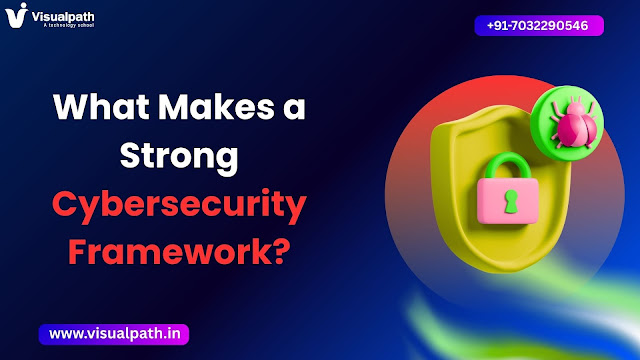- Get link
- X
- Other Apps
What Makes a Strong Cybersecurity Framework?
Cybersecurity is no longer a luxury it's a necessity. Organizations across industries face increasingly complex cyber threats, from ransomware to insider breaches and sophisticated phishing attacks. To defend against these threats effectively, companies need more than just toolsthey need a comprehensive cybersecurity framework. But what exactly constitutes a strong cybersecurity framework, and how can businesses implement one that withstands evolving risks? Let’s explore the core components that define a robust cybersecurity structure.
 |
| What Makes a Strong Cybersecurity Framework? |
1. Risk Assessment
and Asset Identification
The first step in building a strong cybersecurity framework is
understanding what needs protection. Organizations must identify critical
assets such as customer data, intellectual property, financial information, and
proprietary systems. Conducting a risk assessment helps determine
potential vulnerabilities and the likelihood of exploitation. This risk-based
approach allows companies to prioritize protection where it’s most needed,
ensuring resources are effectively allocated.
2. Clear Policies
and Governance
A robust cybersecurity framework is grounded in well-defined security
policies and governance structures. These policies should outline access
controls, password protocols, acceptable use of systems, remote access rules,
and incident response procedures. Importantly, governance should not only exist
on paper—it needs to be enforced, monitored, and regularly updated to reflect
changes in technology and regulations. Best Cyber
Security Courses
3. Multi-Layered
Defense Strategy
Cybersecurity isn't about one tool—it’s about layers of protection.
Known as defense in depth, this strategy includes firewalls, intrusion
detection systems (IDS), antivirus software, endpoint protection, and secure
network architecture. In addition, strong authentication mechanisms like multi-factor
authentication (MFA) add an essential layer of user verification. This
layered approach ensures that even if one defense fails, others are in place to
mitigate threats.
4. Continuous
Monitoring and Incident Response
No framework is complete without real-time monitoring and a
tested incident response plan. Security Information and Event Management
(SIEM) tools play a key role in identifying suspicious activity and generating
alerts. Equally important is having a predefined response process in place who
takes action, how breaches are contained, and how data is recovered.
5. Employee
Awareness and Training
A strong framework invests in employee education and ongoing
training to recognize threats like phishing, social engineering, and
insecure behavior. Awareness programs foster a security-first culture, turning
employees into the first line of defense rather than weak links.
6. Compliance and
Regulatory Alignment
Compliance with industry standards and regulations is essential.
Frameworks like NIST Cybersecurity Framework, ISO/IEC 27001, and GDPR
offer structured approaches to securing systems and data. A strong
cybersecurity strategy aligns with these frameworks to ensure legal and
regulatory requirements are met, helping avoid costly penalties and
reputational damage. Cyber
Security Online Training
7. Scalability and
Adaptability
Cyber threats evolve—and so should your cybersecurity framework. A rigid
system becomes obsolete quickly. Effective frameworks are scalable,
allowing for the integration of new technologies like AI-based threat
detection, and adaptable, enabling quick response to emerging threats.
Regular audits, feedback loops, and system updates are critical to maintaining
relevance and strength over time.
Conclusion
A strong
cybersecurity framework is not a one-time project but an ongoing commitment. It
requires a blend of strategic planning, technological investment, and human
vigilance. From risk assessments and layered defenses to employee training and
regulatory compliance, each component plays a vital role. In an era where
cyberattacks are a matter of “when,” not “if,” only a well-structured and
adaptive cybersecurity framework can offer the resilience organizations need to
protect their digital future.
Trending
Courses: Salesforce
Marketing Cloud, GCP
Data Engineer Training, Gen
AI for DevOps
Visualpath is
the Leading and Best Software Online Training Institute in Hyderabad
For More
Information about Best Cybersecurity
Contact
Call/WhatsApp: +91-7032290546
Visit: https://www.visualpath.in/online-best-cyber-security-courses.html
- Get link
- X
- Other Apps
Comments
Post a Comment